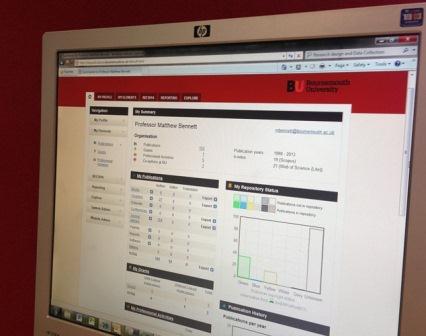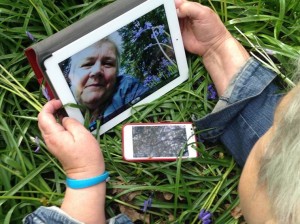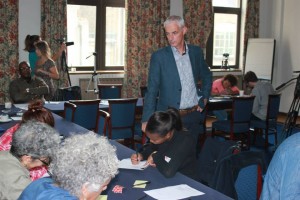One of the things that struck me about the recent coverage of the UKIP conference (which, as I will explain, is not entirely unrelated to the pamphlet that struck Michael Crick) was that many UKIP members complained that the controversy surrounding Godfrey Bloom’s comments overshadowed their emergence as a real political force. It seems certain that at the next European and local elections, and possibly even at the general election, UKIP will be a major player. My research background in EU law means I am interested in how the political world frames and explains EU issues, and particularly the extent to which political positions reflect the laws underpinning them. UKIP’s manifesto is a rich source here, and this is the perhaps tenuous connection to the document that played such a starring role in the Bloom-Crick kerfuffle.
Reading through Nigel Farage’s keynote speech – with the intention of writing a post about the EU laws underpinning his comments on immigration – I stumbled across this statement: ‘our laws have come from Brussels – and what laws. What directives. What a list of instructions. How this shall be done. How that shall be regulated’.
This struck me for several reasons. Much of my research is concerned with the relationship between EU law and EU democracy (I’m sure many readers would argue that it is now my phrase that is striking, even an oxymoron – without wishing to go into too much detail, the EU does have democratic processes, even if their effectiveness and suitability is questionable). Because of this background, whenever a politician talks about ‘Brussels’ or ‘EU laws’, I am put slightly on edge. They are broad terms that risk oversimplifying a complicated area. Debates about EU democracy need to be based on clear understandings of the underpinning laws; otherwise one risks, in Mr Farage’s words, ‘playing the man and not the ball’.
With that in mind, I’d like to look at two aspects of the quotation I highlighted above – the references to ‘Brussels’ and ‘laws’ – and explain that the situation is not quite as simple as the speech makes out. My analysis is going to be a brief one focused on the relevant legal procedures – Channel 4’s FactCheck blog has some interesting posts on the statistical side of the speech.
Brussels
It is very common to hear politicians talking about Brussels as an umbrella term for the EU, either positively or negatively. But what does it mean? When ‘Brussels’ makes law, who is actually making them?
The answer is lawyerly: it depends. The EU acts on the principle of conferred powers. This means it can only legislate in areas mandated by the Treaties – if it enjoys a so-called ‘legal basis’. For example, the EU has some environmental law competences because of Articles 191-192 of the Treaty on the Functioning of the European Union. Each legal base found in the Treaties requires a particular legislative procedure, and each process calls for different involvement from the Council (made up of elected national ministers), the European Parliament (directly elected MEPs) and the Commission (an appointed body but one which typically proposes laws rather than passes them).
Broadly speaking, since the Lisbon Treaty most EU laws have been made using the ‘ordinary legislative procedure’. This was previously known as ‘co-decision’. Under this procedure, the Commission proposes legislation (sometimes prompted by the Parliament or national ministers), but it is not a legislative body. A majority of votes in the Council and the European Parliament must agree on the final draft of a particular proposal before it becomes law. Less frequently there will be a ‘special legislative procedure’, which normally means the Parliament is just consulted by the Council; on rarer occasions it sees no role for the Parliament or gives the Parliament a veto.
So, does a monolithic ‘Brussels’ pass these laws? Not exactly. EU laws are passed through a process of negotiation and bargaining amongst elected national ministers and elected MEPs. Even if the MEPs are sidelined, promulgation remains the responsibility of elected national ministers. This may be imperfect, but it perhaps differs to the common perception.
Laws
It is interesting that the speech uses the words ‘directive’ and ‘regulated’. This is because Directives and Regulations are two different kinds of EU law, and each works in a different way. This doesn’t mean that the EU is not passing laws which affect the UK, but it does mean that EU laws are not diktats.
A Regulation is binding on Member States from the moment it is passed: it has ‘direct effect’. Those laws do indeed tell Member States ‘how this shall be done’ – for example, a common customs code – although one might point out that laws tend to tell people what to do. As noted above however, it is the Member States themselves, and usually elected MEPs, that have agreed to whatever course of action is proposed.
A Directive on the other hand gives far more discretion to Member States. Directives set out a certain goal – for example, make sure EU citizens can move and reside freely across the EU (with certain caveats) – but it is only the goal that is binding. Member States can pursue that aim however they wish, and it is not unheard of for a given state’s domestic law to already comply with the Directive. In that regard Directives certainly do not tell states ‘how this shall be done’.
Once again then, the situation seems more complex that it has been made out. The image of ‘Brussels’ telling states ‘what to do’ is not necessarily accurate.
Final thoughts
There is an understandable and important debate occurring about whether the UK should remain in the EU, but it should be based on a clear picture of how the EU operates. Phrases such as ‘Brussels’ and ‘EU laws’ are commonplace, but they risk oversimplifying the issues. Decisions and policy ought to follow from a more solid basis. A clearer understanding of the law leads to a more informed debate.
About David Yuratich
David Yuratich is a lecturer in law at Bournemouth University. His research interests include the constitutional law in the UK and the EU law, and the relationships between courts and democracy.
![]() Every BU academic has a Research Professional account which delivers weekly emails detailing funding opportunities in their broad subject area. To really make the most of your Research Professional account, you should tailor it further by establishing additional alerts based on your specific area of expertise.
Every BU academic has a Research Professional account which delivers weekly emails detailing funding opportunities in their broad subject area. To really make the most of your Research Professional account, you should tailor it further by establishing additional alerts based on your specific area of expertise.

























 Beyond Academia: Exploring Career Options for Early Career Researchers – Online Workshop
Beyond Academia: Exploring Career Options for Early Career Researchers – Online Workshop UKCGE Recognised Research Supervision Programme: Deadline Approaching
UKCGE Recognised Research Supervision Programme: Deadline Approaching SPROUT: From Sustainable Research to Sustainable Research Lives
SPROUT: From Sustainable Research to Sustainable Research Lives BRIAN upgrade and new look
BRIAN upgrade and new look Seeing the fruits of your labour in Bangladesh
Seeing the fruits of your labour in Bangladesh ECR Funding Open Call: Research Culture & Community Grant – Apply now
ECR Funding Open Call: Research Culture & Community Grant – Apply now ECR Funding Open Call: Research Culture & Community Grant – Application Deadline Friday 12 December
ECR Funding Open Call: Research Culture & Community Grant – Application Deadline Friday 12 December MSCA Postdoctoral Fellowships 2025 Call
MSCA Postdoctoral Fellowships 2025 Call ERC Advanced Grant 2025 Webinar
ERC Advanced Grant 2025 Webinar Update on UKRO services
Update on UKRO services European research project exploring use of ‘virtual twins’ to better manage metabolic associated fatty liver disease
European research project exploring use of ‘virtual twins’ to better manage metabolic associated fatty liver disease